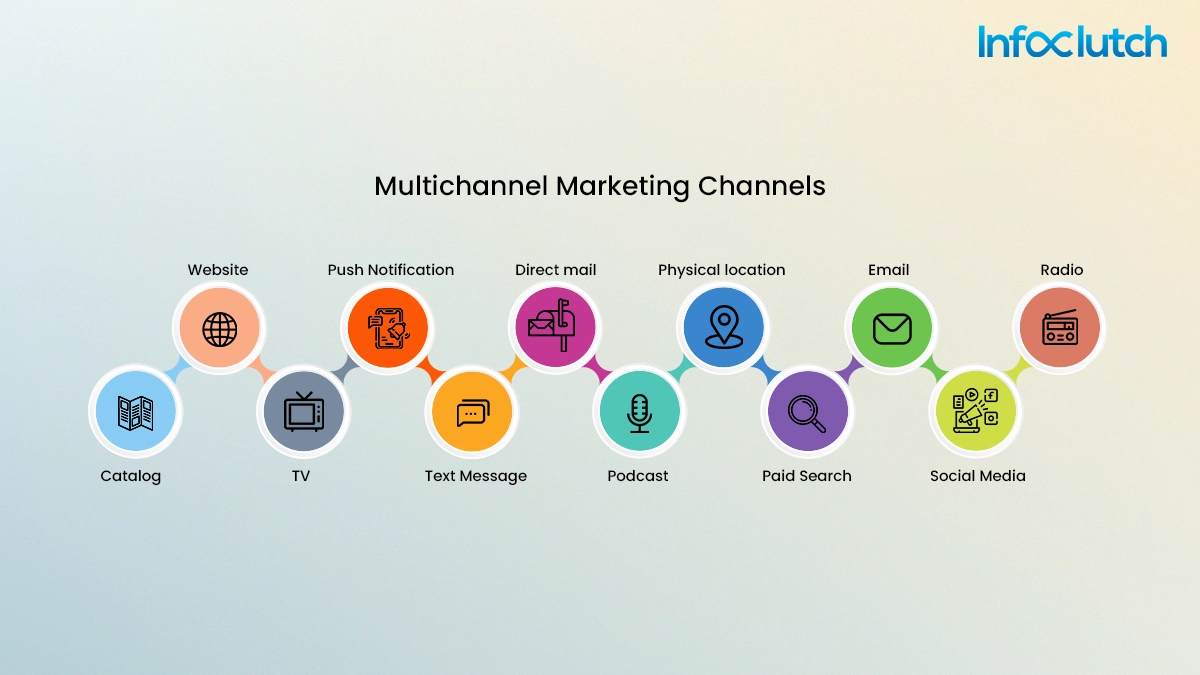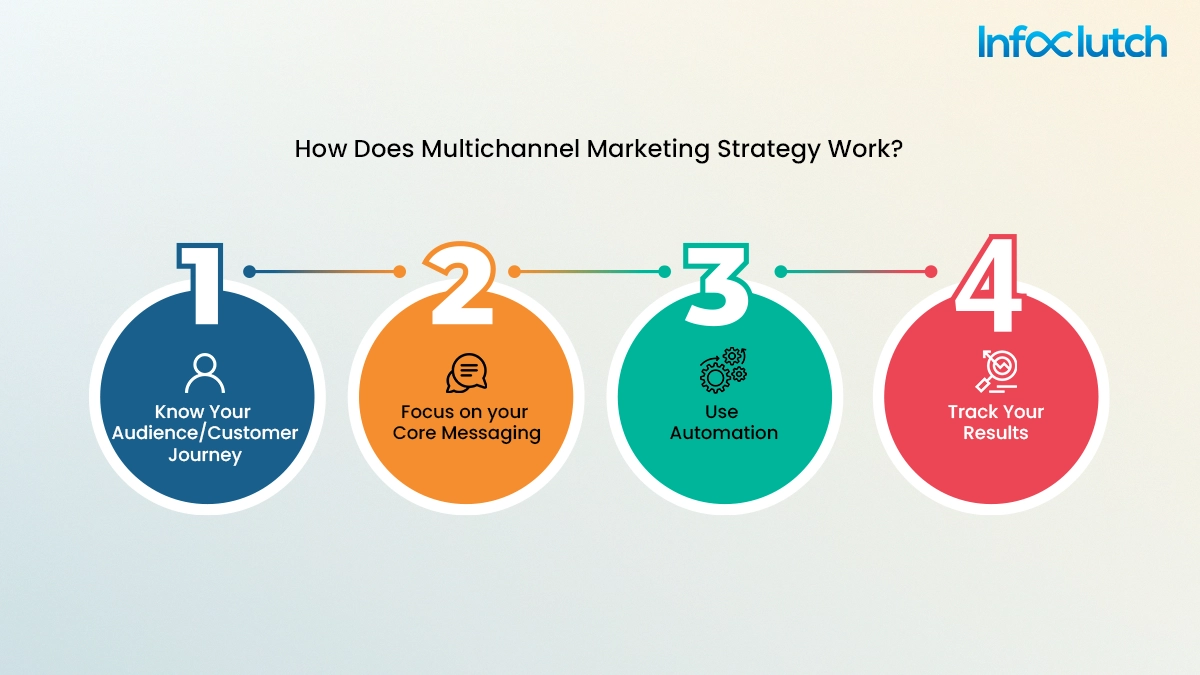What is Multi-Channel Marketing?
Multi-channel marketing is a strategy that gives businesses better flexibility through digital and offline marketing channels for selling products & services and for better target audience engagement. It enables businesses to obtain higher brand awareness by understanding the needs and requirements of their audience. The multi-channel marketing industry is anticipated to broaden its spectrum to reach $28.6 billion by 2030 at a growth rate of 22.3% annually.
Stats Update:
- Companies that use a multichannel marketing technique see a 91% increase in customers retained annually.
- According to 72% of B2B consumers, a multichannel strategy is the preferred way to interact with brands and enterprises.
- 84% of the marketers acknowledge that multichannel initiatives outperform efforts conducted exclusively through one medium.
Let us understand more about multi-channel marketing, their importance, channels, and benefits shortly in this informative blog:
What Are the Channels of Multi-Channel Marketing?

Developing a right multi-channel marketing strategy can compound the efforts put in by the organization to achieve brand awareness. Choosing the suitable channels can help you achieve your business goals & develop engaging relationship with your audience.
Let us identify the key marketing channels that are used often:
1. Digital Channels
Digital channels play a predominant role for a B2B business that primarily wants to spread out the brand’s name for sales growth and obtain a prospective client base. Noteworthy elements under digital channels are:
- Websites
- Email marketing
- Social media platforms
- Content marketing
2. Offline Channels
Essential components fuelling offline channels can help you obtain your business deliverables easily, which consist of the following:
- Print media
- Banners
- OOH
- Billboard ads
- Pamphlets, etc.
Despite the significant growth in digital trends, offline mediums are still testing their mettle against the test of the time.
3. Mobile Channels
One of the newest tools in the arsenal of marketing has to be mobile channels. Businesses can maximize their brand’s reach through:
- SMS blasts
- Push notifications, and more.
4. Emerging Technology
The evolving market has witnessed a notable increase in demand for utilizing advanced technology for influencing and acting as a growing factor for magnetizing website traffic. This includes:
- Automated Chatbots
- Virtual Reality (VR)
What Are the Benefits of Using Multi-Channel Marketing?
Corporations invest a large portion of their revenue to form multi-channel marketing strategies. We’ll walk you through on how businesses can benefits from multi-channel marketing strategies:
1) Positive Brand Awareness
The massive potential of multi-channel marketing can skyrocket your brand in the market. It can deliver insights and information to the audience based on their preferences and needs, resulting in high-quality engagement and larger consumption of information related to your products and services.
2) Amplified Customer Interaction
Multichannel marketing implements and delivers more personalized business information that suits the interests of the desired audience. This ensures that the information is engaging across all the marketing channels.
3) Sales & Revenue Volume Expansion
Strengthening your rapport and relationship bond with your consumers using multi-channel marketing can result in a customized, engaging experience for better sales growth. Providing high-enabled value can result in higher brand loyalty and higher sales conversion.
4) Brand Recognition
Corporations that are aiming to expand their business outlook can use multi-channel marketing as a remedy. It gives the brand a soothing tone for representing its products and services to its targeted audience. This would help your customers recognize your brand instantly while operating on various other marketing platforms.
5) Data-Driven Business Insights
Based on interest pattern of the targeted audience, businesses can gain a foolproof understanding on the purchasing combinations of consumer behavior. The negative responses such as impressions and engagement rate metrics can help businesses comprehend and make suitable choices for selling of their products and services.
What Are the Challenges of Multi-Channel Marketing?
Every fruitful marketing channel has its own set of challenges that marketers encounter regularly. Let us quickly find out the ongoing challenges in the multi-channel marketing strategies:
1) Higher Resource Consumption
Multi-channel marketing applies a broad category of channels for delivering business information to the desired target group. This can get taxing on the allocated funds; the higher the channel counts, the more management is required, which attracts extensive budget investment, leading to higher time consumption.
2) Complexity in Delivering the Needs of the Audience
Customers’ demands can be overwhelming in the business realm, causing challenges in opting for a suitable channel for providing business information. Marketers must narrow down the factors such as customers’ purchasing behavior, demographics, and in-app behavior to persuade them to make a call to purchase the products.
3) Consistent Brand Tone across Channels
Organizations find delivering consistent information supporting their brand identity extremely challenging across multi-channel marketing platforms. The businesses must be sharp on the information that is put across on these channels as they might get confusing or irrelevant after a specific duration.
What Are the Steps to Create a Multi-Channel Marketing Strategy?
Multi-channel marketing is an effective medium that is used for communicating with your targeted customers for investing in your brand.
Let us find out the steps to develop an effective multi-channel marketing strategy:
- Narrow down the audience segments that has the potential of purchasing your developed products. This can be done based on their interest, age group and operating business sector.
- Invest adequate funds on suitable channels to perform multi-channel marketing strategies. This includes the resources, human force and more.
- Brands should develop a uniform pattern in delivering product details to potential prospects. An engaging strategy will keep the audience hooked to your brand irrespective of a change in platforms.
- The marketing performance should be supervised using analytics tools. This would help businesses identify the hits and misses touched during the marketing phase.
- Businesses should be prepared with a retargeting strategy for collectively bringing together the customers who wandered or lost interest halfway through the marketing strategy.
- Brands must document the KPIs and other metrics that were achieved. Identify the errors committed post-launching the strategy and avoid repeating similar ones to obtain the desired business goals.
What Are the Best Techniques to Implement In Multi-Channel Marketing?

Multi-channel marketing is the fuse that helps the organization operate swiftly in the industry. With a clearer view of multi-channel marketing and its benefits and challenges, let us find the ideal techniques involved:
1. Identify and Diversify the Needs of Your Target Audience
- Formulating a formidable multi-channel marketing strategy must address the demands and trends identified during market analysis.
- Businesses must identify the pain points of their customers while strategizing & mapping the content that can pacify their needs and also persuade them to make a decision.
- This would provide a solid foundation to implement multi-channel marketing effectively across various platforms.
2. Organize High-Networking Business Meets
- The sales cycle in B2B businesses tends to get extended; developing a brand’s trust in your audience is fundamental for the growth of your sales pipelines.
- Attending industry events and trade shows in person for networking purposes with your targeted audience will make you appear significantly pleasing, build trust, and extend fruitful relationships.
3. SEO Optimization of Your Digital Platform Presence
- Businesses must value the potential of search engine optimization of their digital presence across various mediums.
- Emphasize the best practices in optimizing the website, which is ideally the first information source business leaders look for. Perform on-page, off-page, and technical SEO to ensure your brand appears at the top of the SERP ranking list.
- Optimizing your social media accounts, primarily LinkedIn, can streamline your brand visibility to the target audience while researching your brand and your products and services.
4. Perform Robust Data Analytics Monitoring
Restructuring multi-channel marketing based on triggered data reports is the key to having a sustainable marketing strategy. Brands can gain accurate insights into the likes and dislikes of the targeted audience using analytics tools to identify KPIs such as ROI, click-through rates (CTRs), impressions, conversion rates, reach, and more.
5. Deliver Excellent Customer Support to Appear Fresh From the Market Competition
- The sales cycle and customer journey is a lengthy process that often requires external consulting support even after the completion of the sales.
- A clear competitive edge can be derived using CRM-friendly tools such as Salesforce, which delivers top-notch support with its competent professional software.
In Summary
The beneficial value that multi-channel marketing provides to businesses is unmatched. The formation of instrumental multi-channel marketing requires a strategic approach that can boost sales growth, nurture potential leads, and expand brand visibility. Staying connected with the needs of your targeted audience will make your brand appear as an industry leader against the numerous market competitors.





